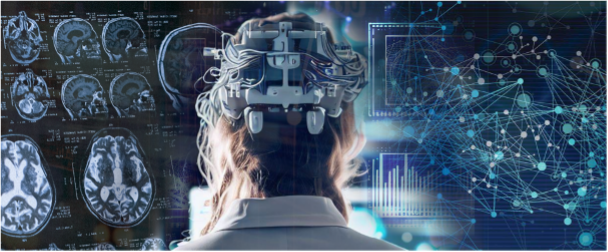TMA4851 - Data and Minds: Forging Future Frontiers
Data and Minds: Forging Future Frontiers

In a data-rich world, Brain-machine interfaces (BMIs) hold potential in medicine and neuroscience. BMIs restore mobility, enhance cognition, redefine interaction. Ethical questions accompany this transformative journey.
We live in a world where data abounds and meets cutting-edge technology such as Brain-machine interfaces (BMI), unraveling astonishing new possibilities in medicine and neuroscience. BMIs are captivating gateways that connect minds and machines in ways that can restore mobility, enhance cognition, or redefine human-machine interaction, to name just a few. This captivating blend of technology and data which has the power to regain lost senses, amplify our cognitive capabilities, and forge new bonds between humans and technology is at the forefront of societal transformation. Yet, it also confronts us with ethical questions, for instance surrounding identity and privacy. As emerging technologies beckon, we strive to unlock the knowledge they harbor, all while crafting strategies to harmonize the greater societal tapestry.
What can we learn from data in emerging technologies such as BMI and meanwhile address societal and ethical considerations?
The focus in the village is to use methods from statistics, mathematics, machine learning, and AI to exploit the secrets hidden in big data, for instance stemming from BMI. Our goal is to bring together teams with diverse backgrounds, leveraging their expertise to tackle challenges. Teams will have the flexibility to choose problems aligned with their interests and adapt them to their unique perspectives. This collaborative approach promotes interdisciplinary solutions to address pressing societal issues.
Relevant competency
Interest in brain machine interfaces, neuroscience, or related areas and their impact on society and technology, as well as a belief in the use of multidisciplinary methods. Further interest and background in data analysis, programming, mathematics, to solve applied problems is an advantage.
About the village
The following are examples in the realm of BMI that the teams can use as starting points:
- Statistical machine learning and AI, e.g. algorithms to automatically extract states from EEG or EMG recordings.
- Mathematical modelling and signal processing of, e.g. neural activity.
- Numerical models for safety and reliability, for instance for electrode placements.
- Ethical considerations for the use of BMI in disease treatments.
Groups might use models or methods and data (e.g. machine learning, optimization, statistics, AI, electricity) and can implement methods on a computer. Depending on background, groups might investigate societal or ethical impacts instead of mathematical analysis or programming. Also, groups will be encouraged to contact relevant external partners.
Facts
- Course code: TMA4851
- Village title: Data and Minds: Forging Future Frontiers
Type: Semester-based
Language: English
Village supervisor: Nicolai Waniek
Contact information: nicolai.s.waniek@ntnu.no
Semester: Spring 2024
Location: Trondheim
Host faculty: IE
